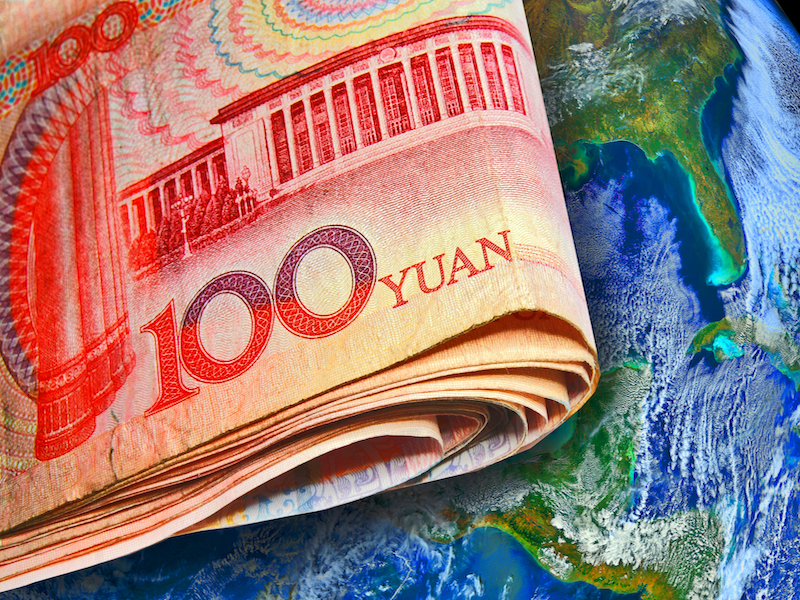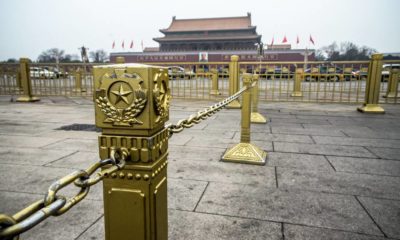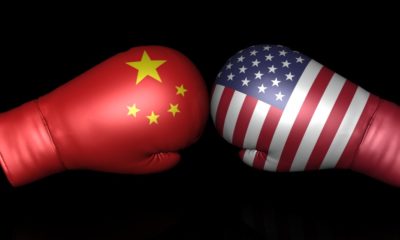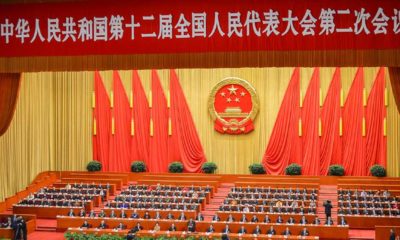bank
What China Stands To Lose

Extrapolation of bearish trends point to uncertain futures as China's boom wanes.
Not for the first time, an expert is expressing doubt about the continuing health of the Chinese economy.
J Kyle Bass of Hayman Capital L.P. has long been one of many voices warning of a hard landing for China as their economic cycle gradually shifts from boom to bust.
He usually predicts a limited global impact, due to China's strong self-dependence, but in February, he wrote a letter to investors that framed the situation more starkly.
In the letter (his first in two years) entitled “The $34 Trillion Experiment: China's Banking System and the World's Largest Macro Imbalance,” he warned that a credit crisis in China could cost the banks there four times as much as the 2007-9 crunch cost the US sector.
Needless to say, that could spell more trouble ahead for the entire global economy.
In Bass's words “What happens in China won't stay in China.”
A History Of Prescience
Bass is a hedge fund manager well-known in financial circles for correctly predicting (and profiting from) the 2008 US sub-prime mortgage crisis.
He founded Hayman in 2005 and has guided the company as its Principal ever since.
His analyses are respected for his tendency to perform in-depth research instead of merely relying on his professional experience.
He has had an abiding interest in mortgages, having hired private investigators in the early days of Hayman to ascertain the ease of obtaining various types of mortgage.
That knowledge prepared him well for the '08 crash, which he anticipated and profited from by purchasing credit default swaps in advance.
[ms_divider style=”normal” align=”left” width=”100%” margin_top=”30″ margin_bottom=”30″ border_size=”5″ border_color=”#f2f2f2″ icon=”” class=”” id=””][/ms_divider]
[ms_featurebox style=”4″ title_font_size=”18″ title_color=”#2b2b2b” icon_circle=”no” icon_size=”46″ title=”Recommended Link” icon=”” alignment=”left” icon_animation_type=”” icon_color=”” icon_background_color=”” icon_border_color=”” icon_border_width=”0″ flip_icon=”none” spinning_icon=”no” icon_image=”” icon_image_width=”0″ icon_image_height=”” link_url=”https://offers.thecapitalist.com/p/warrenbuffet/index” link_target=”_blank” link_text=”Click Here To Find Out What It Said…” link_color=”#4885bf” content_color=”” content_box_background_color=”” class=”” id=””]Warren Buffett Just Told His Heirs What He Wants them To Do With His Fortune When He Dies. [/ms_featurebox]
[ms_divider style=”normal” align=”left” width=”100%” margin_top=”30″ margin_bottom=”30″ border_size=”5″ border_color=”#f2f2f2″ icon=”” class=”” id=””][/ms_divider]
China's rise

It has been hard to ignore China's economic ascent over the last decade:
In 2005, their banking sector was worth approximately $3 trillion.
It has grown more than 1000% in the decade since to a valuation of over $34 trillion.
The manufacturing industry spearheaded that expansion, but now that success is swelling the middle and upper classes, the manufacturing capacity appears to have reached saturation.
This has shifted the economy somewhat more towards consumerism.
People are buying foreign goods in far higher quantities than before, and growth in manufacturing is not dependable anymore.
This creates different import-export dynamics than China has historically had to deal with.
Growth stalling

Mr. Bass' warning about China comes in yet another year of diminished Gross Domestic Product growth for the country.
As seen in the graph, annual growth has dropped on average about a third of a percent each of the last few years, and although the trend appears to be flattening, confidence in continued growth is wavering.
Unhealthy lending
While China's economy continues to grow, the momentum behind it appears to be running out.
That momentum has been driven in real terms, claims Bass, by the Chinese government's national infrastructure development program.
He says that the vast and complex program was enabled by expanding the lending market within the country, but that lending decisions are now seemingly being made along political, rather than financial lines.
Essentially, he's saying loans are being granted based more on who you know or where you live, than your ability to repay it.
Based on that assumption, Bass expects 8.5-10% of Chinese loans will fail to perform.
That will likely trigger a credit contraction, compounding the natural cycle of growth and slump.
Mr. Bass believes this current Non-Performing Loan cycle has already begun.
Just another case of history repeating
Bass says the Chinese system has been reacting to the stall by increasing leverage to an excessive degree, regulating inconsistently and arbitrarily, and generally fostering an irresponsibly risk-prone lending culture.
If that sounds familiar, that's because the US was doing the same thing in the lead-in to the 2008 crash.
Also, there is a “shadow banking” system operating in the background of China's banks.
These are financial instruments set up to circumvent the patchy regulations restricting risky lending.
Together, Bass believes these factors represent a ticking time-bomb.
Mr. Bass cites a 10% loss of value to the system as a possible lower-bound of this speculative slump.
That translates to $3.5 trillion worth of Yuan.
If that occurs, he expects China to try to counteract the losses from these non-performing loans by printing Yuan.
He fears the slump will be deeper, though: in the last cycle, China's GDP contracted by 30%.
If history repeats itself, which he believes is plausible, it will require somewhere on the order of $10 trillion worth of Yuan to be printed.
That could devalue the currency by as much as 30% relative to the US dollar, ultimately shaving 1.5% off US growth in knock-on effects.
China is not the US
While this might all sound very pessimistic, Bass has in the past sounded optimistic about the fallout of such a slump in China.
In the US in 2008, the banks that failed were crucial global players.
In contrast, Chinese banks tend to service China and its immediate neighbors.
There are many direct connections to global markets, but the markets do not rest upon these banks they way they did upon the likes of Lehman Brothers in 2008.
Instead of an instantaneous shock to the global system, a Chinese slump is likely to ripple out through chained transactions – although its immediate effect in South East Asia would be unpleasant.
No Way Out?

In 2008, US banks lost $650 billion, and Chinese banks now stand to lose four times that figure, but China has reserves of $3.2 trillion in foreign-exchange funds:
While China can use this to offset any slump, Bass points out that after various commitments, the real value of the reserve is closer to $2.1 trillion – not enough to cover the sort of shortfall he predicts.
He has suggested in the past that they could make up the difference by printing bonds and recapitalizing their banks – just as the US did in '08 – the letter seems to indicate decreasing confidence on his part in such a plan.
That may be due to the measures already being taken by China to stabilize growth, which has seen the Yuan fall in value by about 6% versus the US Dollar over the last year:

Chinese Yuan per US Dollar over the last year
Despite the saw-tooth nature of that graph, the People's Bank Of China has been trying, through various techniques, to smooth out the process of devaluing the Yuan.
They've pulled Yuan out of Hong Kong, raising the value of the Yuan against the Hong Kong dollar, and making it more expensive to trade in Yuan there.
They've issued requests for banks making loans in Yuan to increase their reserves.
The unified nature of the Chinese power structures comes to the PBOC's aid, too, in the media.
Newspapers and blogs in the country have been excoriating in their criticism of people like Bass and George Soros, who have made loud statements and high-profile bets against the currency.
To Bass, such defensiveness only confirms his interpretation of the state's financial prospects.
Prediction, not prophecy
Before we all start shouting on street corners about the collapse of China's banks, we should step back and take a more sober look at the situation. Bass has had a lot of success in, as he puts it “recognizing anomalies” and acting in the best way to capitalize on them, but he and Hayman have had their fair share of duds, too.
For example, they've been waiting since 2010 for Japanese Government Bonds to go bad:

Japanese Government Bond values over the last five years.
…but instead, the bonds have held up, even surging since February, and Bass' once-prophesied Japanese financial crisis has failed to materialize, even in the wake of 2011's natural disasters there.
Hayman Capital returned less than 2% last year, so perhaps take his predictions with a grain of salt.
Uncertainty, certainly
Bass is far from the only observer of the evolving state of Chinese finances.
Most still hold his earlier view that China has at its disposal sufficient reserves and financial instruments to sure-up and recapitalize its banks if need-be.
With recent movements on the international markets by the PBOC – such as the last month's day-on-day sharp rises in value in response to the dollar's fall, it is evident that there is a firm hand on the wheel of the Yuan. It remains to be seen if that hand belongs to a wise navigator.
Whether the predictions of people like J Kyle Bass' are correct or not, one thing is for sure: The Chinese banking sector and their economy and culture as a whole have entered a new era.
The backbone of plentiful labor and low cost-of-living on which their success has been built is necessarily transforming itself.
As it is with any nation that successfully leverages a low-skill workforce to boost its economy, the workforce starts to benefit from the boost and raise their expectations.
The Chinese government and PBOC will have to navigate these socioeconomic shifts to avoid pulling the rug out from under their own feet.
Judging by their adaptability over the last few decades, if there's any country that can pivot to balance in a changing world, it's China.















